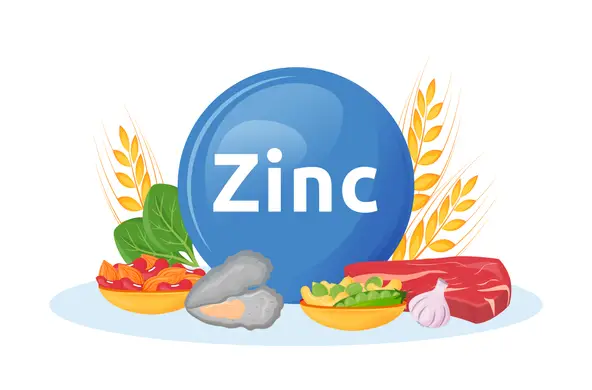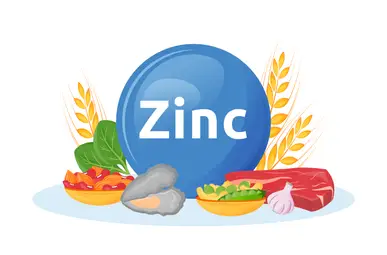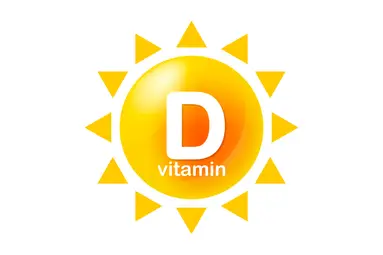Top 9 Zinc Rich Food Sources for Vegetarians

Top 9 Zinc Rich Food Sources for Vegetarians
Posted on 14th Mar, 2023
Zinc is an essential mineral that plays a vital role in many bodily functions, including immune function, wound healing, and protein synthesis. Here are some foods that are rich in zinc:
Here is a list of foods that are enriched in zinc
Legumes:

Chickpeas, lentils, kidney beans, black beans, and white beans are all good sources of zinc containing between 1.8mg - 2.5mg of zinc per serving.
Dairy Products:

Milk, cheese, and yogurt are all good sources of zinc for lacto-vegetarians. For vegans, fortified plant-based milk and yogurt are good options. You can expect to obtain between 0.9mg - 1.4mg of zinc per serving.
Nuts & Seeds:

Pumpkin seeds, sesame seeds, cashews, pine nuts, and almonds are all good sources of zinc containing around 0.9mg - 2.9mg per oz.
Vegetables:

Spinach, kale, mushrooms, peas, and asparagus all contain zinc. You will find quantities ranging from 0.5mg to 1.4mg per cup of the above cooked vegetables.
Whole Grains:

Brown rice, wheat germ, and oatmeal are all good sources of zinc. You will obtain between 0.9mg to 2.7mg of zinc per serving.
Dark Chocolate:

Dark chocolate is also a source of zinc. A 100-gram bar of dark chocolate contains about 3.3 mg of zinc.
Soy Milk:

Soy milk is fortified with zinc and other nutrients. A cup of soy milk contains about 1.1 mg of zinc.
Fortified Cereals:

Some cereals are fortified with zinc and other nutrients. A cup of fortified cereal can contain up to 3.8 mg of zinc.
Tofu:

Tofu is a good source of zinc for vegetarians. Half a cup of tofu contains about 1 mg of zinc.
Dosage
The recommended dietary allowance (RDA) for zinc varies based on age, gender, and other factors. Here are the RDAs for zinc according to the National Institutes of Health:
- Infants 0-6 months: 2 mg/day
- Infants 7-12 months: 3 mg/day
- Children 1-3 years: 3 mg/day
- Children 4-8 years: 5 mg/day
- Children 9-13 years: 8 mg/day
- Teen boys 14-18 years: 11 mg/day
- Teen girls 14-18 years: 9 mg/day
- Adult men: 11 mg/day
- Adult women: 8 mg/day
- Pregnant women: 11 mg/day
- Breastfeeding women: 12 mg/day
It's important to note that zinc supplementation should only be done under the guidance of a healthcare professional, as excessive zinc intake can be harmful.
Side Effects and Warnings
Consuming too much zinc can cause adverse effects such as:
- Nausea and vomiting
- Diarrhea
- Headaches
- Stomach cramps
- Loss of appetite
- Metallic taste in the mouth
- Kidney and liver damage
- Anemia
- Reduced immune function
- Copper deficiency
It is recommended to not exceed the daily upper limit of 40 mg of zinc for adults, and to avoid taking zinc supplements for prolonged periods without consulting a healthcare professional. People with certain medical conditions such as kidney disease, sickle cell anemia, and gastrointestinal diseases should also be cautious when taking zinc supplements. Pregnant and breastfeeding women should consult their healthcare providers before taking zinc supplements.
Conclusion
In conclusion, zinc is an essential mineral that plays a vital role in many physiological processes in the body. It is important for a healthy immune system, wound healing, and proper growth and development. Zinc supplements may be beneficial for individuals who are at risk of zinc deficiency, including pregnant and lactating women, vegetarians and vegans, and individuals with certain health conditions.
However, it is important to be cautious when taking zinc supplements, as high doses can lead to adverse effects such as nausea, vomiting, and diarrhea. Long-term use of high doses of zinc can also lead to copper deficiency and other health problems.
Therefore, it is important to consult with a healthcare provider before taking zinc supplements and to follow the recommended dosage guidelines to avoid any potential adverse effects.

Health articles from our experts

Top Hair Growth Multivitamins in India 2024

Which Vitamin Deficiency Causes Hair Loss? A Complete Guide

The Best Hair Care Products for Different Hair Types and Concerns

8 Ways To Use Apple Cider Vinegar For Dandruff

6 Surprising Benefits Of Omega 3 For Hair

7 Benefits Of Ashwagandha For Hair

Top 9 Zinc Rich Food Sources for Vegetarians

Benefits of Vitamin D for Men

Top 9 Biotin Rich Foods

